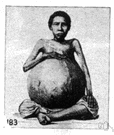hydrops
Also found in: Thesaurus, Medical, Wikipedia.
Related to hydrops: endolymphatic hydrops, corneal hydrops
hydrops
(ˈhaɪdrɒps)n
1. (Medicine) a swelling caused by excessive fluid in cells or tissues
2. (Medicine) a severe swelling of the entire body caused by excess fluid and accompanied by anaemia, occurring in foetuses and newborns affected by haemolytic disease. Also called: fetal hydrops or hydrops fetalis
Collins English Dictionary – Complete and Unabridged, 12th Edition 2014 © HarperCollins Publishers 1991, 1994, 1998, 2000, 2003, 2006, 2007, 2009, 2011, 2014
ThesaurusAntonymsRelated WordsSynonymsLegend:
Switch to new thesaurus
| Noun | 1. |  hydrops - swelling from excessive accumulation of watery fluid in cells, tissues, or serous cavities hydrops - swelling from excessive accumulation of watery fluid in cells, tissues, or serous cavitiesangioedema, atrophedema, giant hives, periodic edema, Quincke's edema - recurrent large circumscribed areas of subcutaneous edema; onset is sudden and it disappears within 24 hours; seen mainly in young women, often as an allergic reaction to food or drugs lymphedema - swelling (usually in the legs) caused by lymph accumulating in the tissues in the affected areas scleredema - a skin disease marked by hard edema of the tissue usually beginning in the face cystoid macular edema - a specific pattern of swelling in the central retina anasarca - generalized edema with accumulation of serum in subcutaneous connective tissue chemosis - edema of the mucous membrane of the eyeball and eyelid lining papilledema - swelling of the optic disc (where the optic nerve enters the eyeball); usually associated with an increase in intraocular pressure brain edema, cerebral edema - swelling of the brain due to the uptake of water in the neuropile and white matter |
Based on WordNet 3.0, Farlex clipart collection. © 2003-2012 Princeton University, Farlex Inc.
Translations
hy·drops
n. hidropesía, hidropsia o edema.
English-Spanish Medical Dictionary © Farlex 2012